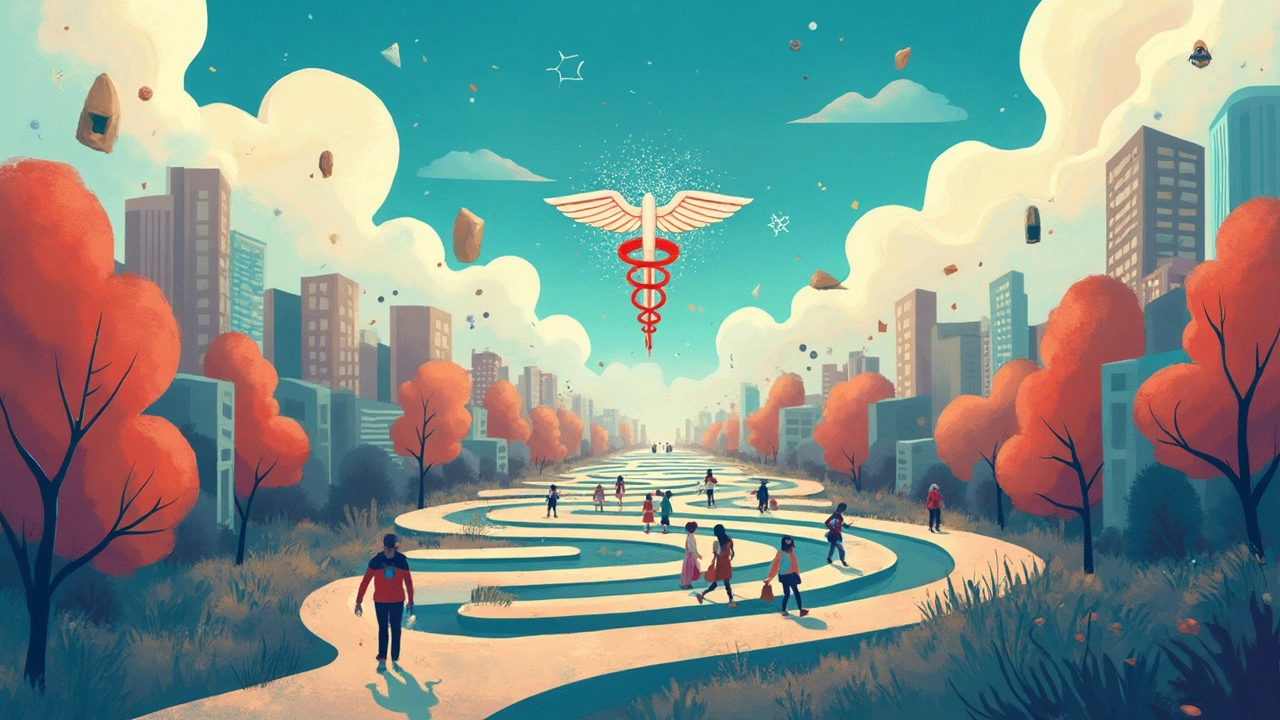 Feb, 7 2025
Feb, 7 2025
Imagine waking up one day with a throbbing headache that won't go away. You're hesitant to see a doctor because, well, you don't have health insurance. In America, being uninsured is more common than you'd think, and it brings a host of challenges.
Firstly, going without coverage means you're financially vulnerable. Healthcare in the U.S. isn't cheap—unexpected medical emergencies can lead to staggering bills that can bankrupt families overnight. Simple visits can run up hundreds of dollars, with more complicated procedures or ER visits skyrocketing into the thousands.
Without insurance, some folks just avoid doctors altogether. This can lead issues to snowball from minor conditions into major health crises. Routine screenings, which can catch diseases early, are often skipped, putting people at a real risk.
Wonder what happens in an emergency? Uninsured or not, hospitals won't turn you away if it's life or death. But those life-saving treatments still come with a hefty price tag that's tough to ignore once you're fit enough to face the bills.
So, what can you do? It's worth knowing about sliding scale clinics and government resources designed to help. There might be more options than you realize to cushion that uninsured blow.
- The Risk of Going Uncovered
- Financial Implications
- Impact on Healthcare Access
- Emergency Situations and Alternatives
- Navigating Options and Resources
The Risk of Going Uncovered
Going without health insurance in America isn't just a gamble; it's a maze filled with financial and health risks. One of the biggest worries? The possibility of medical debt. An uncovered illness or injury can leave you with bills that are nearly impossible to pay off. Did you know that medical debt is a leading cause of bankruptcy in the U.S.?
And it's not just about the money. There's a real risk to your health, too. Without healthcare coverage, you might skip routine check-ups or delay necessary medical care, leading to more severe health issues down the road. This can be especially dangerous for managing chronic conditions like diabetes or heart disease, where regular doctor visits and medications are essential.
Hidden Costs Everywhere
Even if you're healthy now, life has a way of changing those plans. Accidents happen; illnesses sneak up on you. Without insurance, what would be minor inconveniences could quickly spiral into financial nightmares.
- Prescription drugs can be incredibly costly without coverage, sometimes even hundreds of dollars for a month's supply.
- Mental health services, often desperately needed, become a luxury many can't afford.
In the end, it's about more than just paying medical costs. It's about safety, security, and peace of mind. Knowing you have coverage means less stress when life throws you a health curveball.
Thinking it can't happen to you? According to studies, a significant percentage of Americans under 65 are just one medical event away from major financial hardship.
Financial Implications
Without health insurance, the financial side of healthcare gets daunting fast. Ever hear the phrase "one step forward, two steps back"? That's kind of what it feels like when hefty medical costs hit your budget.
A report from the Kaiser Family Foundation laid it out clear as day: nearly one in five uninsured adults has serious financial trouble due to medical bills. And these aren’t just folks skipping a fancy vacation or cutting back on coffees—this is about paying rent or buying groceries.
"Being uninsured can put patients at risk of financial strain," says the Kaiser report. "This often leads to hard choices, like prioritizing basic living expenses over healthcare."
Cost of Common Medical Procedures
Consider a typical visit to the ER. In the U.S., the average cost for a non-insured patient can spin anywhere from $300 for something minor to over $3,000 for moderate issues without any major procedures involved. That’s enough to make anyone think twice about popping in when things don’t seem too bad.
For long-term conditions, like diabetes or heart disease, costs can escalate from hundreds to thousands annually. Medications, check-ups, and necessary therapies drain bank accounts faster than you might expect.
Tackling Unforeseen Medical Expenses
So, what’s a smart plan? How can you manage these medical costs without losing your shirt? Here are some actionable tips:
- Set Up a Health Savings Account (HSA): These can help stash away money tax-free for medical expenses. Might not cover everything, but every little bit helps.
- Research Community Clinics: Some offer services based on income on a sliding scale. A great alternative if you need something checked out but aren't ready for a bill in the mail.
- Negotiate Bills: Yeah, you read that right. Sometimes hospitals or doctors will cut you some slack if you ask.
The financial reality of lacking health insurance in America is harsh, but knowing what you're up against and planning a bit can make the road a tad less bumpy.

Impact on Healthcare Access
Going without health insurance in America doesn't just hit your wallet; it also affects how you interact with the whole healthcare system. If you're uninsured, that doctor's appointment for a nagging cough or yearly check-up may feel like more of a luxury than a necessity.
Many uninsured folks delay seeking care, waiting until things are unbearable. This can often turn a small problem into a bigger one that's tougher to treat. The Centers for Disease Control and Prevention (CDC) noted that uninsured adults are three times more likely to skip routine medical care than those with insurance.
When it comes to prescriptions, without insurance, prices can be jaw-droppingly high. A lack of insurance often means people either don't fill prescriptions or seek cheaper alternatives, which might not always be as effective. This isn't just an inconvenience; it's a health risk.
Preventive Services and Screenings
Another key issue is missing out on preventive services. Health insurance usually covers screenings for cancer, diabetes, and cholesterol levels—critical checks that catch issues early on. Without this coverage, the rate of serious health conditions going unnoticed increases, which can lead to severe consequences down the line.
Health Disparities
Being uninsured also highlights and exacerbates health disparities. Certain communities, especially those with lower incomes, face more challenges accessing care. These groups might delay or forgo medical attention entirely due to financial constraints, further deepening the gap in health outcomes.
| Health Issue | Percentage of Uninsured Not Seeking Care |
|---|---|
| Routine Care | 32% |
| Serious Illness | 15% |
In the end, the lack of insurance makes healthcare a game of roulette. It's a cycle of tough choices and risks, one that affects not only individual health but also community well-being. Having some form of insurance isn't just about financial protection; it's a ticket to proactive and preventive healthcare that can make all the difference in staying healthy.
Emergency Situations and Alternatives
When life throws an unexpected medical emergency your way and you lack health insurance, the panic can be as intense as the ailment itself. In America, hospitals are required by law to treat you in a true emergency, whether you have insurance or not. This is thanks to the Emergency Medical Treatment and Labor Act (EMTALA), which mandates emergency care at hospitals that accept Medicare and Medicaid.
However, while your immediate health might be taken care of, the pile of medical bills that follows can feel like another crisis. Emergency room visits can easily cost thousands of dollars—these aren't figures most folks can shrug off. The lack of coverage can mean setting up payment plans or, worse, going into debt.
Seeking Alternatives Before an Emergency Hits
It's wise to do some research on alternatives before you're in a bind. Look at community health centers and clinics that offer services on a sliding fee scale based on your income. You might not feel like these will compare to mainstream healthcare, but they're often staffed with dedicated professionals ready to help.
- Community Health Centers: They provide a wide range of services and you pay what you can afford.
- Retail Clinics: Located in drugstores or superstores, these can provide basic care for less cost.
- Discount Programs: Some pharmacies and hospitals offer programs to help with costs.
Programs Offering Help
If you're uninsured, consider looking into Medicaid. Eligibility criteria can be strict, but it's worth checking to see if you qualify. States may vary in their rules, so double-check the specifics where you live.
For temporary solutions, healthcare discount cards can also cut costs, although they're typically not a replacement for insurance.
| Option | Potential Savings |
|---|---|
| Community Health Centers | Pay based on income |
| Retail Clinics | Reduced fees for basic care |
Remember, while managing without health insurance is challenging, exploring all available resources can make a significant difference in how you deal with emergencies and plan for the future.

Navigating Options and Resources
Being without health insurance in America might seem overwhelming, but there's a range of options and resources that could offer some relief. The trick is knowing where to look and how to tap into them.
Government Programs
First off, check out government programs like Medicaid. It's aimed at providing coverage for families and individuals with low income. Each state's eligibility varies, so it’s worth digging into what your state offers. The Affordable Care Act (ACA) exchanges also provide subsidized plans based on income tiers, offering more healthcare security than going completely uninsured.
"Medicaid is a lifeline for millions of low-income Americans, helping to ensure they have access to essential health services," says Dr. Paul Offit, a respected health policy expert.
Community Health Centers
These centers are gold. Community health centers offer services on a sliding scale based on what you can afford. Everything from routine check-ups to dental care can be pretty reasonable, making them an excellent avenue for basic medical costs without needing insurance.
Online Health Consultation Services
For those minor but nagging health questions, telemedicine can be a cost-effective option. Many services now offer consultations at a fraction of in-office visit costs, and some even provide prescriptions. It’s a nifty way to handle minor issues or get a professional’s advice without leaving home.
Payment Plans and Discounts
If you do end up with a hefty bill, don't panic. Hospitals often have financial assistance programs and might offer negotiated rates or payment plans. It’s always worth discussing options with your provider—many are willing to work with you rather than see bills go unpaid.
Being savvy about where to look for assistance can help mitigate the stress of being uninsured. There are temporary fixes and long-term strategies, all key in avoiding the worst-case financial scenarios often associated with America's healthcare system.
